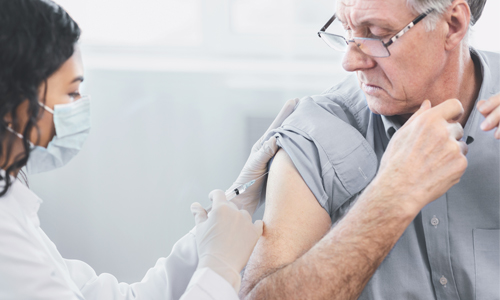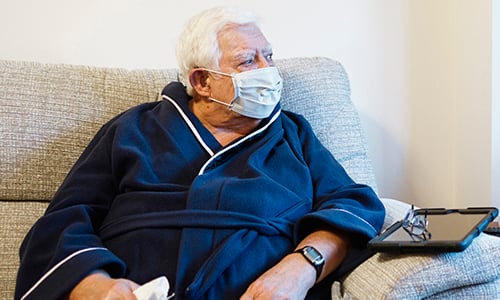Over the last three months, the numbers of people with coronavirus in England have changed in a very unpredictable way: decreasing, then flattening off, increasing, and most recently decreasing again. Whether the numbers are going up or down, however, they have been reasonably high throughout.
The Office for National Statistics publishes estimates each week of the number of people who have coronavirus, and since June this has been at least 1 in 100 people.
During this last few months, older people have remained less likely than other age groups to have coronavirus, and the majority of infections have been among younger groups, particularly children, who have not yet had the opportunity to be vaccinated. The fact that around 95% of older people have had both first and second doses of the coronavirus vaccination has offered most older people excellent protection against catching and becoming ill with coronavirus. The most recent analysis from the ONS shows that unvaccinated people have been 32 times more likely to die of coronavirus this year than fully vaccinated people.
Waning
There is now evidence that the protection against catching coronavirus provided by both the Pfizer/BioNTech and Oxford/Astra-Zeneca coronavirus vaccinations gradually declines over time. However, protection against serious illness remains very high for at least 5 months, with evidence from Public Health England showing that Pfizer/BioNTech and Oxford/Astra-Zeneca provide 95% and 80% protection against hospitalisation, respectively, 5 months after the second jab. Although we don’t know much about how the protection from vaccination wanes over the longer term, there are concerns that the protection against hospitalisation may decrease.
The Effectiveness of boosters
There is now firm evidence that having a booster vaccination provides substantial additional protection against becoming ill with coronavirus, over and above the protection provided by the first two doses. Pfizer's clinical trial found that the booster provided 95.6% protection against becoming ill with coronavirus compared to just having two doses. Results of a study of the population of Israel – where they are further ahead in their vaccination programme than in England – found a similarly high level of protection from the boosters.
What’s happening with boosters?
Booster jabs started being administered in the middle of September, and since then nearly 7 million people in England have received a third coronavirus vaccine, with almost a quarter of a million people having one each day at this point. However, around 13 million people had their second jab 6 months or longer ago, suggesting that there are now around 6 million people in England who are eligible for but have not yet had their booster.
What should I do?
If you’ve not already been vaccinated against coronavirus, everyone over the age of 12 is now eligible to book, including those older people who haven’t yet taken up the opportunity. Anybody who had their second jab 6 months or longer ago is now eligible for a booster. People going for their first, second or booster vaccination can book on the NHS website or go to a walk-in clinic. You can now book your booster once it is 5 months since your second vaccination. For more information, read Age UK's information and advice.
Antivirals
This week we heard the news that the Medicines and Healthcare products Regulatory Agency (MHRA) has licenced an antiviral drug – molnupiravir – for use in the UK. The drug prevents the virus from multiplying in the body, so if given to someone in the early stages of illness with coronavirus can halve the chances of them becoming very unwell. The MHRA have said that the drug can be offered to older people aged 60 and older and other people at higher risk of severe illness from coronavirus. However, they are also clear that the drug isn’t a substitute for vaccination, which is more effective at preventing serious illness.





